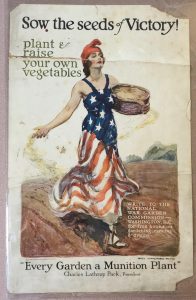Drawing upon information from their collections and additional historical research, the Berks History Center (BHC) will embark upon an educational campaign and community story-telling project to promote home gardening for food security in Berks County and beyond. The initiative focuses on the revitalization of historic victory gardens, providing both the historical context and practical information for home-scale food production.
The “Berks History for Victory” launches digitally on Monday, April 13th on the Berks History Center’s social media platforms and will feature home gardening techniques for both urban and suburban residents as well as the national and local history behind victory gardening. Homeowners and renters alike are encouraged to participate and share stories about their victory gardening efforts using the hashtag #BerksHistoryforVictory
Currently closed to the public as ordered by Governor Tom Wolf and the PA Department of Health, the BHC has continued its operations remotely, employing all staff for the duration of the shut-down. Although many day-to-day roles involve interacting with visitors, the BHC quickly re-strategized after closing in March and developed creative ways to continue serving their community in a time of need.
“Despite losses to a significant portion of our revenue stream, our team has been able to adapt quickly, developing creative solutions to allow the organization to retain staff and continue fulfilling our mission,” says Executive Director, Benjamin Neely.
In the first week of the shutdown, the BHC launched “Berks History at Home” an educational resource page on the BHC website. The page allows families to explore Berks County’s history digitally with entertaining videos, a wealth of stories and articles, and a variety of resources and learning activities for families including downloadable coloring pages, junior historian prompts and more. Additional content is being released on the Berks History Center’s social media channels.
As state-wide stay at home measures were implemented, the BHC looked to the history books and discovered that in times of crisis, the American people, and more specifically the people of Berks County, have always shown ingenuity, been adaptive, and overwhelmingly generous.
“In the past, producing food at home was an act of national solidarity in times of crisis, collectively taking the strain off of the American food system during the great world wars. Today, with uncertainty in our future, we can look to the lessons of the past to get us through this difficult time,” says Associate Director, Alexis Campbell.
“Gardening can be daunting for some, but we hope to demonstrate that home food production is both possible and fun, not to mention therapeutic. Even if you only grow one potted plant, we hope that gardening at home will be a source of inspiration and comfort, connecting you to the past and uniting our community in troubled times.”
First promoted during WWI, Americans were encouraged to produce their own food by planting vegetable gardens in their backyards, churchyards, city parks, and playgrounds.
At that time, the City of Reading offered residents several areas around town to start victory gardens, encouraging citizens to raise their own vegetables for consumption and conserve farm produce for the war effort. Gardens sprung up all over Reading, from the Hampden and Buttonwood reservoir plots, to the grounds near Sternbergh’s Stirling and Spring and Weiser Streets. Open city blocks, city parks with reservoirs or open land on private property were all made available to Reading residents for rent or free of charge.
Victory Gardens were again promoted by the U.S. government during World War II complementing a country-wide Food Rationing Program in 1942. Victory gardens were widely promoted during 1943 through 1945. However, once the war ended, so did government promotions and America’s reliance on victory gardens.
The “Berks History for Victory” campaign is primarily a digital learning experience, with historic images, stories and instructional videos released on social media. Two BHC staff will provide video-journals of their home gardening efforts. The BHC hopes to expand the program, by installing a small demonstration garden and living exhibit on the grounds of the BHC museum, located at 940 Centre Ave. However, plans to do so are tentative and dependent on the status of the state-wide stay at home order.
The “Berks History for Victory” campaign will complement a “Victory Container Garden” initiative led by District 1 Councilwoman, Lucine Sihelnik. By joining Sihelnik’s District 1 Victory Container Garden taskforce, the BHC will work to cultivate the community food system during the outbreak. Further collaborations are expected to grow, as the BHC and the task force encourage all citizens, community organizations, and businesses to get behind the revitalization of home food gardening.
“Victory Gardens are a positive way to feed our community, inspire stewardship, and are fruitful economically,” says Councilwoman Sihelnik.
The BHC invites families in Reading and Berks County to join them in their campaign to promote local food security during the COVID-19 pandemic by learning about the history of victory gardens and growing their own gardens at home, wherever possible.





